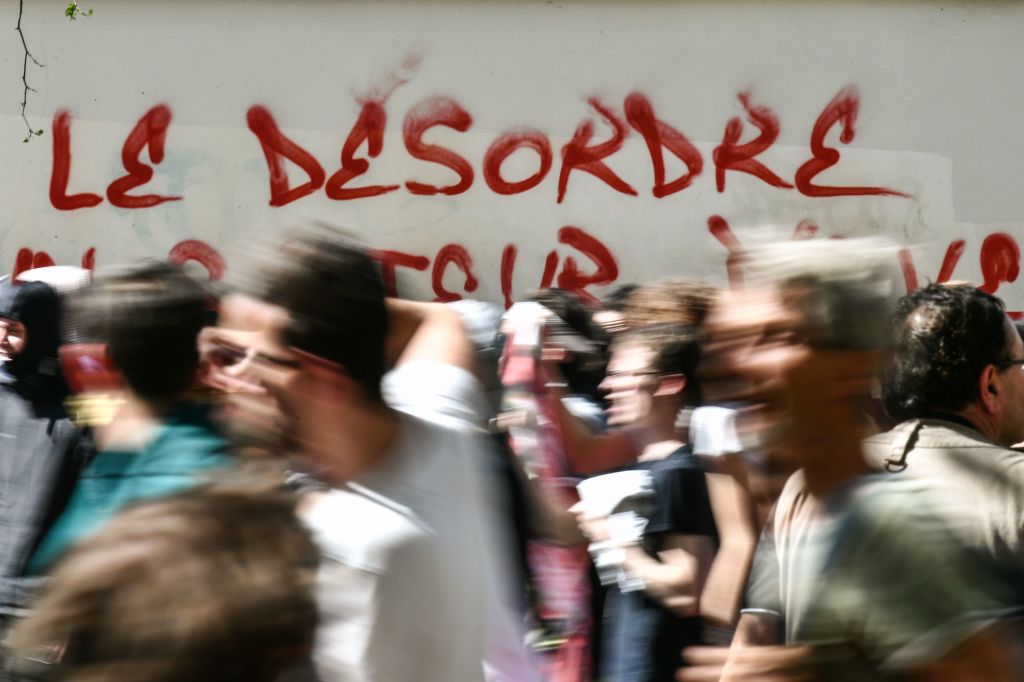There is a belief in some quarters of the Anglosphere that the French are too wise to succumb to what they refer to as ‘wokisme’. It’s true that in recent weeks Emmanuel Macron and his education minister, Jean-Michel Blanquer, have expressed their concern about what the latter described as a battle against ‘an intellectual matrix from American universities’. But the battle has already been won by the far-left in France who are largely in control of all forms of education.
The front cover of this week’s edition of the conservative magazine, Valeurs Actuelles, says it all:
‘Universities: laboratory of the lunatics’
Inside, the magazine describes how radical feminism, decolonization and cancel culture are rife on the country’s campuses. As if to prove the magazine’s point, the leader of France’s National Union of Students this week admitted in a radio interview that white students are barred from attending some university events.
As in Britain, the ideology that began in universities is now spreading to schools and wider society in France, as two recent surveys revealed. The first, conducted last November in the wake of the murder of the teacher Samuel Paty by an Islamist, canvassed more than 1,000 18- to 30 year-olds on a number of subjects. Sixty-one percent described Islamophobia as a ‘reality’ and 57 percent believed laïcité is often deployed to oppress Muslims. In contrast, among wider French society 87 percent think that laïcité is under threat from Islamic extremism.
The second survey was conducted last month among 15- to 17-year-olds. It reported that half of those surveyed believed religion should not be mocked, the same percentage that said religious symbols should be permitted in school. As to the slaying of Samuel Paty for showing his pupils a picture of the Prophet Mohammed during a class on freedom of expression, 17 percent said he should not have done it; a quarter refused to answer the question.
François Kraus, the director of the polling company that conducted the surveys, blamed the results on the ‘Americanization’ of France’s young:
‘It’s the victory of an Anglo-Saxon vision of things, or even Islamist. The religion is no longer perceived as a set of values in which one believes, but an integral part of one’s identity.’
Nowhere is this ideology more prevalent than in universities. Recently two professors at Grenoble University were placed under police protection after they questioned whether Islamophobia should be bracketed alongside racism and anti-Semitism. Posters were soon plastered around campus declaring ‘Fascists in our lecture halls’ and ‘Islamophobia kills’.
One of Macron’s ministers, Marlene Schiappa, described the posters as ‘really odious acts after what happened with the decapitation of Samuel Paty…we can’t put up with this type of thing.’
Fine words, but they are 50 years too late. The takeover of French universities by the far-left began in the 1970s, when, incidentally, Schiappa’s father, Jean-Marc, still a militant Trotskyist, was a student.
Indeed, far from American universities exporting woke ideology to France, there is a strong case for claiming its origins lie in the ‘French Theory’ exported to America in the 1970s by philosophers such as Jacques Derrida, Gilles Deleuze and Michel Foucault. The latter romanticized the Iranian Revolution in the late 70s in a series of articles, and his acolytes in the 80s became known as ‘Palestino-Progressistes’, redefined in the 90s as ‘Islamo-Progressistes’.
The history of this ideology that brooked no dissent was described in a 2001 book by the essayist Jean Sévillia called Le Terrorisme Intellectuel, in which he traced its roots to the end of the second world war. The following year the philosopher Pierre-André Taguieff coined a new term, one which has stuck: Islamo-Gauchisme. He first used it in an essay entitled ‘The New Judophobia’, writing:
‘The Jews can be tolerated, even accepted in this Islamo-Gauchist movement…on condition that they show proof of their unconditional support for Palestine and their fanatical anti-zionism.’
You could argue that the progenitor of ‘wokisme’ was actually Maximilien Robespierre, the man who ordered the destruction of statues and crosses, and who did away with the Christian calendar. ‘True religion’, he said in 1791, ‘consists in punishing for the happiness of all, those who disturb society.’
And how did Citizen Robespierre punish the people who disturbed society? He canceled them, with the guillotine.
This article was originally published on The Spectator’s UK website.


















